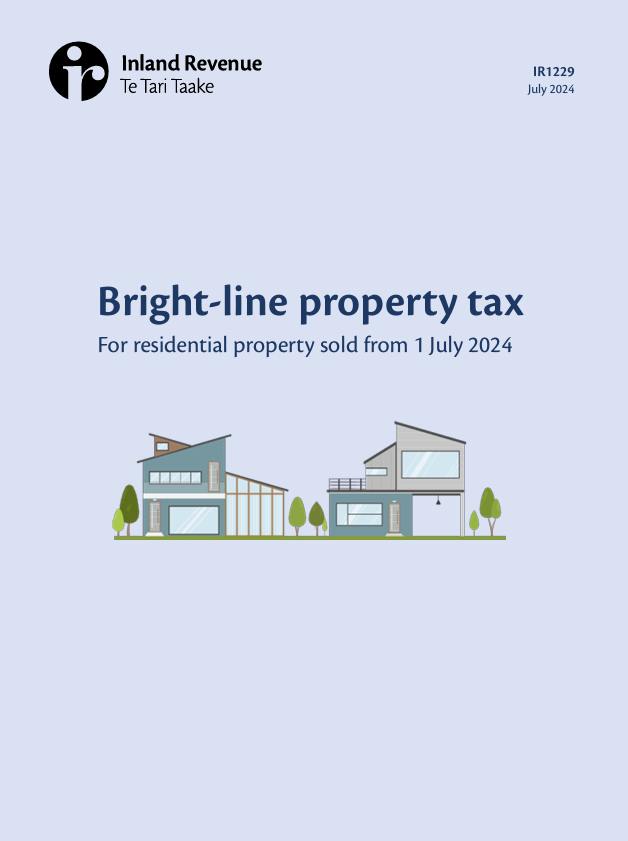Changes to Property Investment and Tenancy Law in New Zealand

The government is making significant changes in the areas of property investment and tenancy law in New Zealand. Here are some of the notable recent and proposed changes that you should know about!
Changes to the bright-line test
The bright-line test is a test that deems profit made on the sale of a residential property to be taxable if sold within a certain period.
From 1 July 2024, the bright-line period has been reduced to two years for properties sold after this date. Previously, the bright-line periods were:-
- Five years if purchased between 29 March 2018 and 27 March 2021;
- Ten years if purchased after 27 March 2021; and
- Five years if the property is a new build.
The bright-line period starts from the date of registration of the Record of Title to you under the Land Transfer Act 2017 and ends when you enter into a binding agreement to sell the property, even if this includes conditions for example finance or builder’s report.
A property will not be taxed under the bright-line test if one of the following exclusions are met:-
- It’s your main home and your use meets the criteria below;
- It’s used predominately as a business premises; or
- It’s being used as farmland or capable of being used as farmland.
The property you live in most of the time is considered your main home. You cannot have more than one main home. You can claim the main home exclusion if you have used more than 50% of the property as your main home or have lived in the property as your main home for more than 50% of the bright-line period.
A property held in trust can use the main home exclusion if the property sold was the main home of a beneficiary of a trust and:-
- The principal settlor does not have a main home; or
- It is the main home of the principal settlor of the trust that is being sold.
The main home exclusion does not apply when you have a regular pattern of buying and selling your main home or if you have already used the main home exclusion twice over the two-year period immediately before you sold your home.
Proposed changes to the Residential Tenancies Act 1986
Changes to the Residential Tenancies Act 1986 (“RTA”) have also been proposed. These changes have not come into law yet, however some the proposed changes are as follows:-
- Landlords can currently end a periodic tenancy, which is a tenancy with no fixed end date, if they meet one of the specified grounds for termination. The proposed law change would reintroduce 90 day “no cause” terminations for landlords. This would mean landlords can end a periodic tenancy without having to give a reason by giving 90 days’ notice.
- The current law requires a notice period of 63 days when the owner or a family member requires a tenanted property to live in or if the property is needed for an employee. Under the proposed law changes this notice period would reduce to 42 days.
- Tenants currently must give at least 28 days’ notice to end a periodic tenancy. Under the proposed law changes, this would reduce to 21 days’ notice.

The proposed changes to the RTA also plan to give landlords the ability to require a pet bond up to a maximum of two weeks’ rent, in addition to a regular bond. Tenants may also be required to obtain written consent from landlords to keep a pet in the rental property, which landlords may only refuse on reasonable grounds.
These proposed changes will erode some of the security and stability given to tenants under the previous changes introduced in 2020.
Activation of Debt-to-Income Restrictions
From 1 July 2024, the Reserve Bank has introduced debt-to-income rules (“DTI”) which will limit the amount of high DTI lending for residential homes that banks can make. This applies to both owner-occupiers and investors.

The DTI rules will restrict banks to lending only:-
- for owner-occupiers, 20% of lending with a ratio greater than 6 (ie borrowing 6 x gross income minus any debt); and
- for investors, 20% of lending with a ratio greater than 7 (ie borrowing 7 x gross income, minus any debt).
We recommend liaising with your mortgage broker or bank as early as possible when looking to purchase a property.
The Reserve Bank explains its rationale for introducing the DTI rules as being an additional measure to ensure that banks are not taking on too much risky lending, so that a wave of defaults during an economic downturn is avoided.
There are exemptions to the DTI rules which include Kāinga Ora loans, refinancing a mortgage where the new loan value doesn’t exceed the original loan value, portability (where you change the property securing the mortgage from the old property to the new one), bridging finance, property remediation (for example a leaky home), and construction loans.
The DTI rules are in addition to existing loan-to-value rules, which limit the amount of low-deposit lending that banks can make.
For further advice on how these changes may affect you, please get in touch with our Property and Projects Team
Contact Experts
Articles and Updates



















